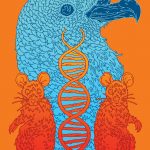
Book Discussion with Fred Gould – The Windup Girl (Art’s Work/Genetic Futures)
Join Dr. Fred Gould, University Distinguished Professor of Entomology at NC State, for a discussion of biopunk sci-fi cult classic The Windup Girl. Part of the Art's Work/Genetic Futures exhibition. ...Continue reading "Book Discussion with Fred Gould – The Windup Girl (Art’s Work/Genetic Futures)"
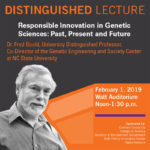
Fred Gould Lecture: Responsible Innovation in Genetic Sciences: Past, Present and Future
Clemson University, Feb. 1, 2019 | Dr. Gould has served on National Research council committees, addressing regulation of genetic technologies in agriculture. Dr. Gould received the Alexander von Humbodlt Award for most significant agricultural research over a fiver-year period, the Sigma Xi George Bugliarello Prize for written communication of science, and the O. MAx Gardner Award in 2012 for being the UNC faculty member with the greatest contribution to human welfare. He was elected to the US. National Academy of Sciences in 2011 and serves on the National Research Council Board on Agriculture and Natural Resources. ...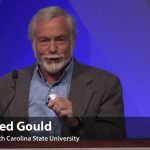
NASEM Sackler SciComm: The promise and perils of gene drives
In November of 2017, an interdisciplinary panel discussed the complexities of gene drive applications as part of the third Sackler Colloquium on “The Science of Science Communication.” This paper builds on the ideas and conversations from the session to provide a more nuanced discussion about the context surrounding responsible communication and decision-making for cases of post-normal science. Deciding to use gene drives to control and suppress pests will involve more than a technical assessment of the risks involved, and responsible decision-making regarding their use will require concerted efforts from multiple actors....Continue reading "NASEM Sackler SciComm: The promise and perils of gene drives"
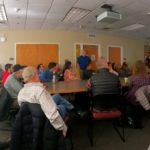
‘Changing the Landscape of Graduate Education’
GES Center to launch NSF-funded AgBioFEWS graduate program, blending natural and social sciences to train next-gen problem-solvers in agricultural biotechnology....Continue reading "‘Changing the Landscape of Graduate Education’"
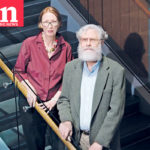
Gould quoted in C&EN: Building bioethics into the future of life sciences innovation
Scientists who refuse to engage with ethicists and the public will find themselves at a disadvantage. “Just because you are a scientist and have invented something doesn’t mean you have authority over it,” says Fred Gould, an entomologist and co-director of the Genetic Engineering & Society Center at North Carolina State University. He points to the National Academies report’s advocacy of participatory decision-making. Resistance from the science community based on ethicists and the public not fully understanding the science wears thin, he says. “You are a pretty poor scientist if you can’t explain what these things are about to an ethicist,” he says....
NBC News – Gould: Exposure levels determine toxicity of glyphosate
“With all things, it is the level of exposure that matters,” said Fred Gould, head of the Genetic Engineering and Society Center at North Carolina State University. “The poison is in the concentration.”...Continue reading "NBC News – Gould: Exposure levels determine toxicity of glyphosate"
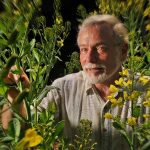
Pesticide Resistance Arms Race
In this episode we talk with Fred Gould, William Neal Reynolds Professor of Agriculture and Life Sciences, about the rising rates of herbicide and pesticide resistance, the current state of the resistance arms race and what we need to do in the future to protect our crops and human health from resistant pests. Length: 15 minutes...
Food Evolution at Meredith College
6:00 – 9:00 PM, Thursday March 22, 2018 Jones Auditorium, Meredith College, 3800 Hillsborough St., Raleigh, NC Amidst a brutally polarizing debate marked by passion, suspicion, and confusion, Food Evolution, from Academy Award-nominated director Scott...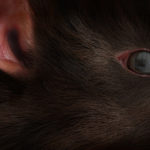
WIRED: Process of Elimination
A deep dive into the inception of the Genetic Biocontrol of Invasive Rodents (GBIRd) program, this article in WIRED details how Karl Campbell of Island Conservation came across GES Co-Director Fred Gould's research suggesting that the genetic engineering techniques being used to manage insect populations could also be applied to other species, like rodents. And then, what happened when CRISPR came along....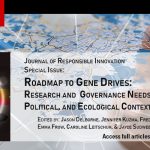
Journal of Responsible Innovation publishes ‘Roadmap to Gene Drives’ special issue
The Genetic Engineering and Society Center at NC State hosted a workshop in February of 2016, supported in part by the National Science Foundation, entitled ‘A Roadmap to Gene Drives: A Deliberative Workshop to Develop...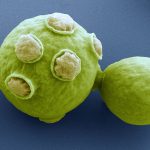
Gould quoted in Nature on synthetic organisms unable to breed with wild counterparts
Fred Gould is quoted in Nature, discussing a gene editing technique designed to make interbreeding between synthetic and wild organisms impossible. The technology, which targets gene expression, could be applied to mosquitoes to control infectious diseases, such as malaria, or to invasive species, like Asian carp. "This is an ingenious system."...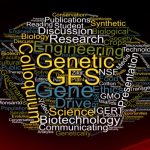
Gene Drives and Responsible Innovation
It is not often that a new technology is at once hailed as a potential solution to pandemic disease, wildlife conservation and hunger, while also being feared as a potential military and environmental “bioweapon.” Gene drives,...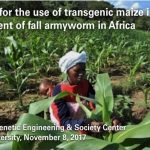
Genetic Engineering may not solve Africa’s fall armyworm problems
The fall armyworm which is a major pest of corn in the western hemisphere has become an invasive pest in Africa in the past few years. Some groups are calling for use of Bt corn as a solution. In this video Dr. Gould describes why it would take great dedication and large resources in money and people to use this approach in an equitable and sustainable manner....Continue reading "Genetic Engineering may not solve Africa’s fall armyworm problems"

Scientific American: Could Genetic Engineering Save the Galápagos?
Campbell first became intrigued by the possibilities of gene drive in 2011, when he sat in on a conference call between biologists at NC State University and officials of the U.S. Fish and Wildlife Service to discuss a possible genetic approach to control a runaway mouse problem on Southeast Farallon Island, about 20 miles west of the California coast, near San Francisco. John Godwin, a North Carolina State neurobiologist who studies animal behavior, had learned of the Farallon issue while skimming the Internet in 2011. He happened to be at a university with an established infrastructure dedicated to experimenting with—and considering the ethical implications of—genetic manipulation....Continue reading "Scientific American: Could Genetic Engineering Save the Galápagos?"
